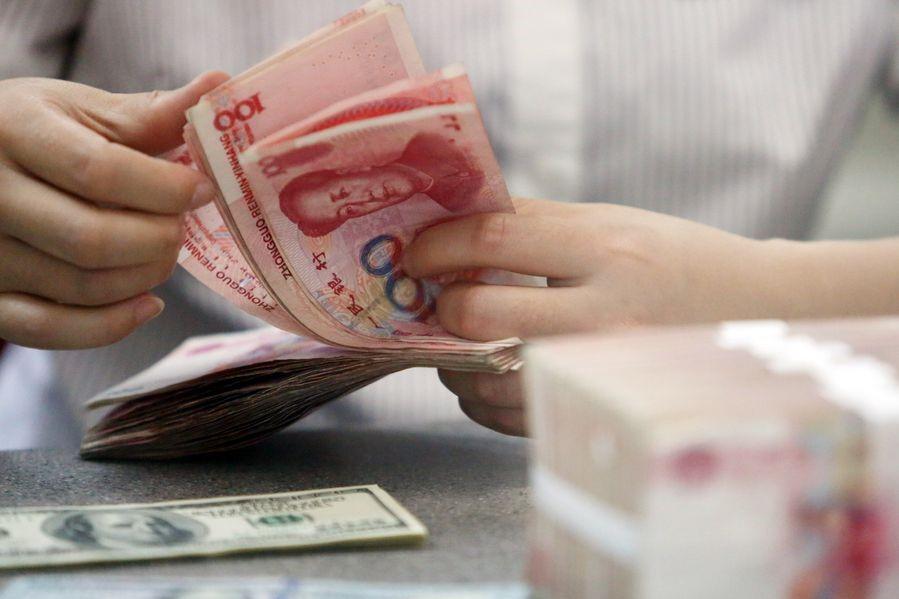Expert: FX swings could shape rates
 0 Comment(s)
0 Comment(s) Print
Print E-mail China Daily, September 13, 2023
E-mail China Daily, September 13, 2023

A worker counts Chinese currency renminbi at a bank in Linyi, East China's Shandong province. [Photo/Xinhua]
China would still have scope for more interest rate cuts in the coming months if the People's Bank of China, the country's central bank, shows it is willing to tolerate and deal with more fluctuations of the renminbi exchange rate, said a leading currency expert.
Guan Tao, global chief economist at BOC International, told China Daily the country has considerable leeway to ramp up fiscal and monetary stimuli given its domestic economic condition that is characterized by low inflation and a negative output gap (where the economy's actual output is less than its potential output).
From an external perspective, however, cutting interest rates further may inevitably aggravate the downward pressure on the renminbi in the short term unless the cut can immediately improve market expectations and brighten economic prospects, said Guan, who had served as head of the Balance of Payments Department at the State Administration of Foreign Exchange in the past.
"As dollar-denominated assets are high-yield assets, a widening US-China interest rate differential could still exert pressure on the renminbi even if the US Federal Reserve does not raise interest rates further," he said.
The renminbi's future movements against the greenback, according to Guan, will hinge on changes in China's economic momentum, US monetary policy, the dollar's strength and the PBOC's foreign exchange policy.
Meanwhile, financial market experts are keeping a close watch on how the PBOC will adjust its monetary policy to solidify a nascent pickup in economic momentum, amid lingering uncertainty over the US Fed's rate hikes.
Most traders said they expect the Fed to hold rates unchanged next week, but are looking forward to US inflation data to be released on Wednesday to make their predictions.
Despite the headwinds of the aggressive Fed's record interest rate hikes, the PBOC cut a key interest rate in June and August by 25 basis points in total, while using a variety of tools to prevent excessive renminbi depreciation, including allowing more foreign debt and releasing banks' foreign exchange required reserves.
After the onshore renminbi hit a 16-year low of 7.3510 per dollar on Friday, the PBOC reiterated its intention to forestall any overshooting of the exchange rate and, in a statement on Monday, said that it won't hesitate to correct any one-sided, pro-cyclical behavior.
"If previous renminbi exchange rate adjustments have fairly priced in various unfavorable factors, then the currency does not necessarily need a bottoming-out economy to stabilize," Guan said.
"Even marginal improvements in expectations would still give a significant boost to exchange rates," he said, adding that a pickup in lending figures for August has helped fuel a rally in the renminbi on Monday, when the onshore renminbi strengthened by 509 basis points to close at 7.2906 per dollar.
Echoing Guan's remarks, Wang Tao, chief China economist at UBS Investment Bank, said the renminbi could slightly strengthen against the greenback by the end of the year.
More time is needed to judge the sustainability of recent marginal improvements in economic data, Guan said, adding that authorities' approach to tackling economic shocks now is fundamentally different from the one they had adopted in 2008 during the Global Financial Crisis.
While the stimulus-led 2008 policy turbocharged short-term economic growth, it also resulted in long-term structural distortions, including debt pileup, overcapacity and asset bubbles, which the Chinese economy is still grappling with, he said.
"Therefore, fewer strong stimulus measures were launched this time," Guan said. "The main focus now is on structural adjustments, with necessary fiscal and monetary support to protect the economy from sliding out of a reasonable range. But, aggressive moves like increasing fiscal deficits or issuing special treasury bonds are avoided."
This approach will help the country to stay true to its commitment to high-quality development and lay a more solid foundation for long-term growth; yet, the price would be lower growth in the short term, Guan said.
He further said recent measures taken to promote structural adjustments and nurture innovation-led new growth engines are crucial for China to fend off any potential risk of going down Japan's path to "the lost decades".
"The Chinese economy is not facing the kind of risks that Japan had encountered, but we need to stay vigilant against the possibility of entering that sort of situation and take preemptive measures," Guan said.






Go to Forum >>0 Comment(s)